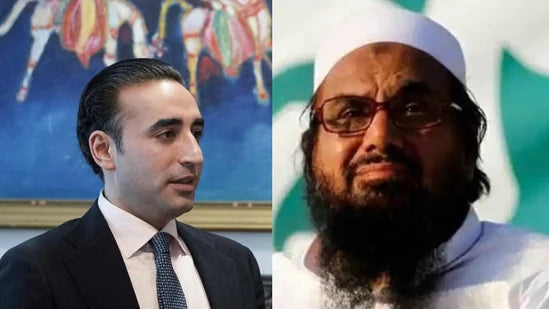Talha Saeed Criticizes Bilawal Bhutto's Stance on Potential Extradition of Hafiz Saeed to India

Talha Saeed, the son of Hafiz Saeed, the mastermind behind the 26/11 Mumbai attacks, has sharply criticized former Pakistan foreign minister Bilawal Bhutto Zardari. This criticism follows Bhutto Zardari's comments suggesting that Pakistan might consider extraditing terror leaders Hafiz Saeed and Jaish-e-Mohammad chief Masood Azhar to India.
In an interview with Al Jazeera, Bhutto Zardari mentioned that as part of a comprehensive peace dialogue with India, Pakistan could think about extraditing the two UN-designated terrorists as a move to build confidence. "I am sure Pakistan would not be opposed to any of these things," he remarked.
This statement stirred immediate controversy in Pakistan, particularly among radical factions. Talha Saeed, voicing his disapproval, condemned Bhutto Zardari's remarks as being "against the state policy, national interest and sovereignty," implying that Bhutto Zardari is either unaware of the situation or supporting the enemy's viewpoint.
Hafiz Saeed has been incarcerated in Lahore’s Kot Lakhpat Jail since 2019 due to terror financing cases, while Masood Azhar, considered among India's most wanted terrorists, is believed by Pakistani authorities to be in Afghanistan. India accuses both of orchestrating major terror attacks on its soil, including the 26/11 Mumbai attacks, the 2001 Parliament attack, the 2016 Pathankot airbase attack, and the 2019 Pulwama attack.
During the interview, Bhutto Zardari noted that Saeed is imprisoned, but Pakistan has not been able to locate Azhar. He stated, "If India provides proof that he is on Pakistani soil, we will be more than happy to arrest him."
Indian officials have consistently accused Pakistan of harboring these terrorists and exploiting legal loopholes to protect them. Recently, Defence Minister Rajnath Singh emphasized that Pakistan must surrender Hafiz Saeed, Azhar, and others if it genuinely aims to combat terrorism.
Bhutto Zardari's remarks also shed light on Pakistan's unease regarding India's new counter-terrorism strategy, notably after Operation Sindoor, wherein India conducted precise strikes against terror launch pads across the LoC. Bhutto Zardari described this change as a "new abnormal."
For Indian observers, this incident underscores the internal contradictions within Pakistan's terror policy, where moderate political voices are often stifled by hardliners, and attempts to collaborate with India are seen as acts of betrayal. Despite being banned by the UN and Pakistan’s own National Counter Terrorism Authority, figures like Hafiz Saeed and Masood Azhar continue to enjoy some degree of protection or legal ambiguity within Pakistan.
The decision now rests with Pakistan, but reactions such as those from Talha Saeed suggest that the path to justice for terrorism victims remains challenging.



















